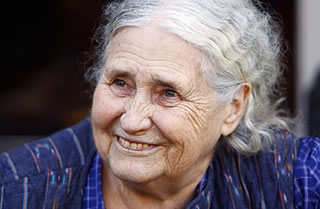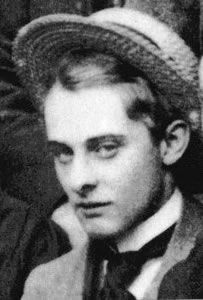De Britse schrijster Doris Lessing werd geboren in Kermanshah, Perzië op 22 oktober 1919. Zie ook mijn blog van 22 oktober 2010 en eveneens alle tags voor Doris Lessing op dit blog.
Uit: The Grass is Singing
„Long before the murder marked them out, people spoke of the Turners in the hard, careless voices reserved for misfits, outlaws, and the self-exiled. The Turners were disliked, though few of their neighbours had ever met them, or even seen them in the distance. Yet what was there to dislike? They simply ‘kept themselves to themselves’; that was all. They were never seen at district dances, or fêtes, or gymkhanas. They must have had something to be ashamed of; that was the feeling. It was not right to seclude themselves like that; it was a slap in the face of everyone else; what had they got to be so stuck-up about? What, indeed! Living the way they did! That little box of a house – it was forgivable as a temporary dwelling, but not to live in permanently. Why, some natives (though not many, thank heavens) had houses as good; and it would give them a bad impression to see white people living in such a way.
And then it was that someone used the phrase ‘poor whites’. It caused disquiet. There was no great money-cleavage in those days (that was before the era of the tobacco barons), but there was certainly a race division. The small community of Afrikaners had their own lives, and the Britishers ignored them. ‘Poor whites’ were Afrikaners, never British. But the person who said the Turners were poor whites stuck to it defiantly. What was the difference? What was a poor white? It was the way one lived, a question of standards. All the Turners needed were a drove of children to make them poor whites.
Though the arguments were unanswerable, people would still not think of them as poor whites. To do that would be letting the side down. The Turners were British, after all.
Thus the district handled the Turners, in accordance with that esprit de corps which is the first rule of South African society, but which the Turners themselves ignored. They apparently did not recognize the need for esprit de corps; that, really, was why they were hated.“

Doris Lessing (Kermanshah, 22 oktober 1919)
De Nederlandse schrijver, cabaretier en televisiepresentator Arjen Henrik Lubach werd geboren in Lutjegast op 22 oktober 1979. Zie ook mijn blog van 22 oktober 2010.
Uit: Magnus
‘Ik had in Groningen en later in Amsterdam vaak gehoopt op de achtbaan die er van je leven kan worden. Jezelf ergens omhoog takelen en dan zonder enige invloed op het traject naar beneden lazeren, zonder de bochten of de duur van de baan te kennen. Het liefst in de striemende regen en in het gezelschap van onbekenden. Nu het eenmaal zover was, was ik misselijker dan ooit.
’(…)
“Waar we precies over hebben gepraat die avond weet ik niet meer. Het zal vermoedelijk een verzameling roddels over klasgenoten geweest zijn. Herinneringen aan Florence, verwachtingen over het examenjaar en wat we daarna gingen doen. Dat is ook niet wat me is bijgebleven. De onderwerpenop zich zijn niet relevant, het zijn de reacties en grapjes over de onderwerpen die maken dat je met iemand nog geen vijf minuten in een lift kan staan of juist vakanties lang samen in ingesneeuwde chalets kan doorbrengen. Vaak denken mensen dat je de diepte in moet, moet raken aan onaangeraakte roerselen, dat je die bij de ander omhoog moet halen, maar dat is onzin: de verdieping zit in structuur, in het vormen van gedachten, in absurdisme, in taal, in humor.”

Arjen Lubach (Lutjegast, 22 oktober 1979)
De Engelse dichter en schrijver Alfred Douglas werd geboren in Ham Hill in Worcestershire op 22 oktober 1870. Zie ook mijn blog van 22 oktober 2010 en eveneens alle tags voor Alfred Douglas op dit blog.
Two Loves
I dreamed I stood upon a little hill,
And at my feet there lay a ground, that seemed
Like a waste garden, flowering at its will
With buds and blossoms. There were pools that dreamed
Black and unruffled; there were white lilies
A few, and crocuses, and violets
Purple or pale, snake-like fritillaries
Scarce seen for the rank grass, and through green nets
Blue eyes of shy peryenche winked in the sun.
And there were curious flowers, before unknown,
Flowers that were stained with moonlight, or with shades
Of Nature’s willful moods; and here a one
That had drunk in the transitory tone
Of one brief moment in a sunset; blades
Of grass that in an hundred springs had been
Slowly but exquisitely nurtured by the stars,
And watered with the scented dew long cupped
In lilies, that for rays of sun had seen
Only God’s glory, for never a sunrise mars
The luminous air of Heaven. Beyond, abrupt,
A grey stone wall. o’ergrown with velvet moss
Uprose; and gazing I stood long, all mazed
To see a place so strange, so sweet, so fair.
And as I stood and marvelled, lo! across
The garden came a youth; one hand he raised
To shield him from the sun, his wind-tossed hair
Was twined with flowers, and in his hand he bore
A purple bunch of bursting grapes, his eyes
Were clear as crystal, naked all was he,
White as the snow on pathless mountains frore,
Red were his lips as red wine-spilith that dyes
A marble floor, his brow chalcedony.
And he came near me, with his lips uncurled
And kind, and caught my hand and kissed my mouth,
And gave me grapes to eat, and said, ‘Sweet friend,
Come I will show thee shadows of the world
And images of life. See from the South
Comes the pale pageant that hath never an end.’
And lo! within the garden of my dream
I saw two walking on a shining plain
Of golden light. The one did joyous seem
And fair and blooming, and a sweet refrain
Came from his lips; he sang of pretty maids
And joyous love of comely girl and boy,
His eyes were bright, and ‘mid the dancing blades
Of golden grass his feet did trip for joy;
And in his hand he held an ivory lute
With strings of gold that were as maidens’ hair,
And sang with voice as tuneful as a flute,
And round his neck three chains of roses were.
But he that was his comrade walked aside;
He was full sad and sweet, and his large eyes
Were strange with wondrous brightness, staring wide
With gazing; and he sighed with many sighs
That moved me, and his cheeks were wan and white
Like pallid lilies, and his lips were red
Like poppies, and his hands he clenched tight,
And yet again unclenched, and his head
Was wreathed with moon-flowers pale as lips of death.
A purple robe he wore, o’erwrought in gold
With the device of a great snake, whose breath
Was fiery flame: which when I did behold
I fell a-weeping, and I cried, ‘Sweet youth,
Tell me why, sad and sighing, thou dost rove
These pleasent realms? I pray thee speak me sooth
What is thy name?’ He said, ‘My name is Love.’
Then straight the first did turn himself to me
And cried, ‘He lieth, for his name is Shame,
But I am Love, and I was wont to be
Alone in this fair garden, till he came
Unasked by night; I am true Love, I fill
The hearts of boy and girl with mutual flame.’
Then sighing, said the other, ‘Have thy will,
I am the love that dare not speak its name.’

Alfred Douglas (22 oktober 1870 – 20 maart 1945)
Zie voor nog meer schrijvers van de 22e oktober ook mijn vorige blog van vandaag.
